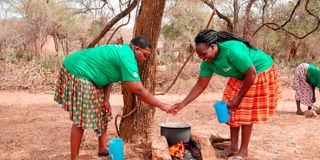West Pokot mothers tackling malnutrition through cooking classes

Women during a cooking demonstration in Cherangan village, West Pokot on January 28, 2023.
What you need to know:
- The programme, which focuses on proper nutrition and good hygiene practices, has helped lower the risk of malnutrition among children aged five and below.
- West Pokot is among counties with the highest malnutrition rate according to the Kenya Demographic Health Survey, 2022.
It’s 2pm and Emily Taruk, a 28 year-old-mother from Parasinda village in West Pokot, is cuddling her six-months-old child as she plaits her neighbour’s hair.
The two are in a group of more than 10 women attending an informal class in Cherangani under a tree. They are listening to Seli Chepyois, a community health volunteer. “Hello mums,” Seli calls out.”
“I am going to show you how to prepare nutritious baby food from what is grown around here.” She says while arranging utensils , preparing the women for a cooking demonstration tailored to their needs. Here, mothers learn to prepare nutritious food using locally available ingredients. The women meet once per month to watch the cooking demonstration, with each bringing food from her home.
The community-based programme, which aims to help in the fight against malnutrition, is bearing fruit in the county, which is grappling with hunger and malnutrition. It aims to improve the well-being of children, from conception up until their second birthday – a period which is crucial for human development. “We used to give our babies tea. We were using dirty breast feeding bottles and our babies used to contract diseases. But now we know how to breastfeed and feed them, all thanks to the cooking lessons,” says Emily. Seli notes that the health of most children in the area has improved since the cooking lessons began, adding that more mothers are also going to deliver in hospitals.
“Previously, many rural women would sell eggs to buy their children sweets and mandazi. They didn’t know how to feed their children properly. Now cases of kwashiorkor and malnutrition have reduced.”
“We have taught them to use free-range chicken and eggs, which are good sources of protein, and not just rely on expensive foods. The mothers also now wash vegetables before cooking and give their children a balanced diet,” says Seli.
The programme, which focuses on proper nutrition and good hygiene practices, has helped lower the risk of malnutrition among children aged five and below.
West Pokot is among counties with the highest malnutrition rate according to the Kenya Demographic Health Survey, 2022.
Leah Chelopay, the county nutrition officer, notes that the programme targets pregnant and lactating mothers. “We trained community health volunteers who in turn train the mothers .”
The project, Nutrition Improvement for Children through Cash and Health Education, is funded by the World Bank through Unicef and implemented by Action for Hunger, Department of social services and the West Pokot County government. Beneficiaries also get Sh2,500 every month.
Unicef County Coordinator Elizabeth Cherop notes that the programme targets 1,400 children.
She says stunting and malnutrition challenges can be addressed within the first 1,000 days of a child.
“The first 1,000 days refers to a child's life from the moment they are conceived until they reach two years of age. We link mothers to community health workers, who train them how to breastfeed and feed the children. We also visit the mothers’ homes two days in a month and ensure children go to hospitals for growth monitoring,” she says. Elizabeth calls on the county governments to allocate funds for nutrition. “We did a recent survey that shows children aged between 6-24 months in West Pokot are not fed well. Parents have no food and have no time to feed children.”
“Residents of this county sell all their food and forget about their families. In a place like Lelan, we have many malnourished children because mothers sell eggs to buy bread. Cultural practices, including nutritional taboos, ensure that pregnant women are deprived of essential nutriments such as eggs,” she notes
Action against Hunger [ACF] Project Manager in the County Salome Tsindore says West Pokot has continued to register poor health and nutrition outcomes, with about half of all children under five years being stunted (too short) at 45.9 percent and 1 in 5 children wasted (too thin) at 11.9 per cent. Dr Solomon Kokwo from the Health ministry said nine mothers’ groups formed in Cherangan area have helped improved children’s health.
“There is drought and everything is drying up. The government should remember this area because crops failed and it is hard to access food. Residents here need food,” he said.





